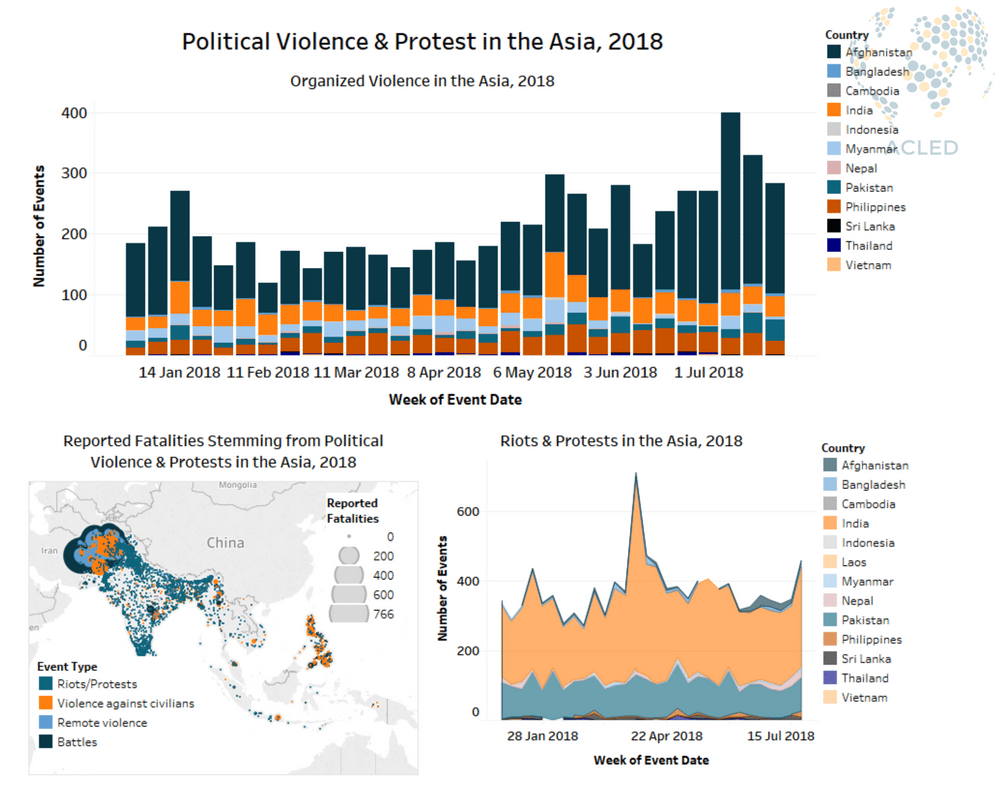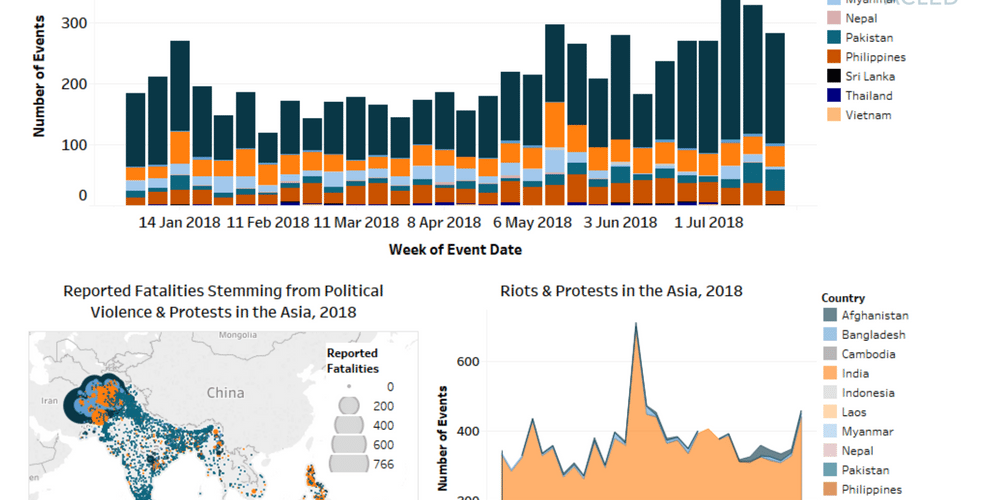Demonstrations dominated the headlines across much of South & Southeast Asia last week, with several of the most notable focusing on demands for changes in government policy in India and Nepal. The Pakistani government also held its 2018 general election last week, which was marred by violence both by those inside and outside the political process. Demonstrations were also reported across the Philippines to mark President Rodrigo Duterte’s state of the nation address. In Afghanistan, the government continues to fight with the Taliban to secure territorial gains, while the Islamic State (IS) carried out a suicide bombing targeting Afghan Vice-President Abdul Rashid Dostum.
In India, a number of protests were staged last week in Manipur, mainly by Bengali speakers, against the controversial Manipur People’s Protection Bill. The bill, passed by the Manipur State Legislative Assembly on July 23, intends to protect the identity of a list of “indigenous people of the state” (The New Indian Express, July 28, 2018), which requires groups defined as non-Manipuris to register themselves under the law within a one-month notification. The protesters had been demanding the state change the base year for recognizing people as natives from 1951 to 1972.
Elsewhere in the country, people from the Maratha caste group demonstrated in Maharashtra state and called a shutdown in Mumbai city to demand a job quota be instituted for their group, which makes up about 30% of the state’s population (The Tribune, July 25, 2018). Although these demonstrations were reportedly largely peaceful across the state, a number of violent incidents were reported in Mumbai, Navi Mumbai, Nashik, Satara, and Thane, where demonstrators reportedly clashed with police and damaged property in several cases.
In Nepal, protests continued to lead thousands of people to the streets over the last week in support of Dr. Govinda K.C., who had been on hunger strike to demand changes in the National Medical Education Bill. The protests ceased after the doctor ended his hunger strike on July 26, following a negotiation with the government, leading to the removal of several provisions from the bill (Kathmandu Post, July 27, 2018).
In the Philippines, peaceful demonstrations were held throughout the country by opposition groups to mark President Duterte’s state of the nation address. Many of these were organized by Bayan, an alliance of left-wing Philippine organizations.
Meanwhile, Pakistan held its first general election since 2013 on July 25. The elections were marred by violence from both inside and outside the political process. The Islamic State, a group firmly outside the political process, carried out a suicide bombing targeting a polling booth in Peshawar that killed 31 people and injured at least 70. This followed their suicide bombing in Mastung the week before that left at least 149 dead. Violence was also reported among political parties however, with minor clashes between supporters of different candidates reported widely across the country as they competed for seats in national and local representative bodies.
In particular, the Pakistan Tehreek-i-Insaf (PTI), Pakistan Peoples Party (PPP), Pakistan Muslim League-Nawaz (PML-N), and Jamiat Ulema-e-Islam-Fazl (JUI-F) were most often reported as being involved in violent events. Following the preliminary announcement of results during which it became clear that the PTI had secured the most seats, parties including the PPP, PML-N, and members of the Muttahida Majlis-e-Amal (MMA) political coalition staged a series of demonstrations across the country against what they perceived as rigged elections.
In Afghanistan, territory continued to be taken by government forces and then re-captured by the Taliban. Two districts in Paktika province – Omna and Gayan – fell to the Taliban but were recaptured the next day. The Taliban also forced the national security forces to abandon Khwaja Ghar district in Takhar province on July 27. A major attack on Atghar district involving as many as 300 Taliban militants was reportedly repulsed by Afghan security forces with dozens of reported fatalities on both sides. Conflicting reports from the Taliban claimed that they had secured the district, which lies along the border with Pakistan’s Balochistan province.
Meanwhile in Afghanistan, demonstrations to demand the return of current Vice President and former Northern Alliance commander Abdul Rashid Dostum subsided following his return from self-imposed exile in Turkey. This exile had lasted almost a year following accusations of torture and sexual assault against a political opponent, which Dostum denies (Afghanistan Times, July 23, 2018). However, upon his return Dostum was targeted by a suicide attack claimed by the Islamic State as his supporters greeted him at Kabul airport. The attack killed 23 people and wounded at least 107, although Dostum remained unharmed (Gulf Times, July 23, 2018).







